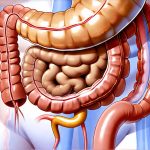Gastrointestinal (GI) distress is an almost universal human experience. Bloating after a large meal, occasional heartburn, or a bout of diarrhea are typically considered normal parts of life – inconveniences we often shrug off as the result of something we ate or stress. However, persistent or unusual GI symptoms can sometimes signal underlying health conditions that require medical attention. It’s crucial to differentiate between typical, self-limiting discomfort and changes in your digestive system that warrant investigation. This article will explore scenarios where seemingly ‘normal’ GI symptoms might be indicative of something more serious, empowering you to recognize when it’s time to seek professional guidance.
Many people underestimate the complexity of the digestive system. It’s not simply a processing plant for food; it’s intimately connected to overall health and wellbeing, impacting everything from nutrient absorption and immune function to mental health. Ignoring persistent or worsening GI symptoms can delay diagnosis and treatment, potentially leading to more significant complications down the line. Understanding your body’s signals and knowing when to listen to them is a vital step in proactive healthcare. This isn’t about self-diagnosing; it’s about being informed and advocating for your health.
Recognizing Red Flags: Beyond Typical Discomfort
Most minor GI issues resolve on their own with simple adjustments like dietary changes or over-the-counter remedies. However, certain symptoms consistently point towards the need for medical evaluation. Persistent abdominal pain – meaning it doesn’t come and go quickly – is a key indicator. This isn’t just discomfort; it’s a sustained ache that disrupts daily life. Similarly, unexplained weight loss accompanied by GI issues should never be ignored. Losing weight without actively trying or changing your diet can suggest malabsorption problems, inflammatory bowel disease, or even cancer. Another red flag is blood in your stool – whether visible or detected during routine testing – as this could indicate bleeding ulcers, polyps, or colorectal cancer.
These aren’t isolated events to dismiss; they are signals that something within the digestive system isn’t functioning optimally. It’s easy to rationalize symptoms away (“it’s just gas,” “I probably ate something bad”), but consistently dismissing these warning signs can have serious consequences. The goal isn’t to become anxious about every stomach rumble, but rather to be aware of changes and seek professional advice when necessary. Remember that early detection is often key to successful treatment for many GI conditions.
Finally, significant alterations in bowel habits – a sudden switch from constipation to diarrhea or vice versa, or a change in stool consistency – should prompt medical attention. These shifts can indicate infections, food intolerances, or more serious underlying issues like irritable bowel syndrome (IBS) or inflammatory bowel disease (IBD). Don’t hesitate to consult with your doctor if you notice these changes persisting for more than a few days.
Inflammatory Bowel Disease (IBD): More Than Just Stomach Trouble
Inflammatory Bowel Disease, encompassing conditions like Crohn’s disease and ulcerative colitis, often begins subtly. Initial symptoms can mimic less serious issues, leading to delayed diagnosis. Chronic diarrhea, abdominal pain, fatigue, and rectal bleeding are common initial complaints. However, IBD isn’t just about digestive discomfort; it’s a systemic inflammatory condition that can affect other parts of the body.
- Joint pain
- Skin rashes
- Eye inflammation
- Liver problems
can all be associated with IBD. Early diagnosis and treatment are crucial to managing the disease and preventing complications like strictures (narrowing of the intestines), fistulas (abnormal connections between organs), and even increased risk of colorectal cancer. If you experience persistent GI symptoms alongside any of these extraintestinal manifestations, it’s vital to discuss IBD with your doctor. Diagnosis typically involves a combination of blood tests, stool samples, endoscopic procedures (colonoscopy or endoscopy), and imaging studies like CT scans or MRIs.
Celiac Disease: A Hidden Autoimmune Response
Celiac disease is an autoimmune disorder triggered by gluten – a protein found in wheat, barley, and rye. Unlike a simple food allergy, celiac disease causes damage to the small intestine, leading to malabsorption of nutrients. Symptoms can be incredibly diverse and often mimic other conditions, making diagnosis challenging. While classic symptoms include diarrhea, bloating, abdominal pain, and fatigue, many individuals experience atypical presentations like anemia, bone pain, neurological problems (headaches, brain fog), or even skin rashes (dermatitis herpetiformis).
A definitive diagnosis requires a blood test to detect antibodies related to gluten exposure, followed by an intestinal biopsy to confirm damage to the small intestine. Strict adherence to a gluten-free diet is the only treatment for celiac disease, and early diagnosis can prevent long-term complications associated with nutrient deficiencies and chronic inflammation. It’s important to note that self-diagnosing and starting a gluten-free diet before testing can interfere with accurate results, so always consult with your doctor first.
The Silent Threat of Colorectal Cancer
Colorectal cancer is one of the most preventable cancers, yet it remains a significant health concern. Early stages often present with no noticeable symptoms, making regular screening crucial. As the disease progresses, however, common signs include:
- Change in bowel habits (diarrhea, constipation, or change in stool consistency)
- Blood in the stool
- Abdominal discomfort or cramping
- Unexplained weight loss
- Fatigue
These symptoms aren’t exclusive to colorectal cancer and can be caused by other conditions. However, they should always prompt medical evaluation, especially for individuals over 45 or those with a family history of the disease. Screening methods like colonoscopy are highly effective at detecting pre-cancerous polyps, which can then be removed before developing into cancer. Other screening options include fecal immunochemical tests (FIT) and stool DNA tests. Don’t delay screening; it could save your life.
It is important to remember that this article provides general information and should not be considered medical advice. Always consult with a qualified healthcare professional for any health concerns or before making any decisions related to your health or treatment.


















